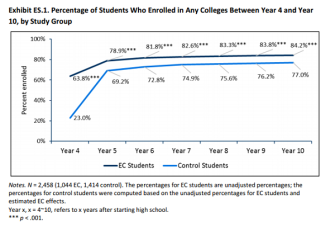
Participating in early-college programs could have a long-term positive effect on students’ college enrollment and completion rates, a new study finds.
Using data from the National Student Clearinghouse, researchers at the American Institutes for Research looked at 2,458 students in 10 early-college programs. These programs enrolled students by lottery. About half—1,044 students—were selected through the lottery for the early-college programs, and the other 1,414 students were not selected.
All of the students in the study attended small high schools, with fewer than 150 students per grade. As a group, about half of the students were white, about half were female, and 44 percent were eligible for free or reduced-price lunch.
The researchers examined data on both groups of students—in early college and not—from 9th grade until they were in their mid-20s.
Overall, they found that students who participated in early college were more likely to enroll in college and complete a degree within six years of high school graduation.

Most of this enrollment advantage came from two-year colleges. Early-college students were consistently more likely than their peers to enroll in two-year colleges—likely because eight of the 10 early-college programs were affiliated with these institutions, said Kristina L. Zeiser, a senior researcher at AIR and one of the authors of the study. Early-college students were also significantly more likely to have completed an associate degree than the students in the control group.
Early-college students were also initially more likely to enroll in four-year colleges than their peers, but by the end of the six-year period, those gaps vanished.
Even so, there were differences in college completion.
Students who participated in the early-college program were more likely to complete a bachelor’s degree than other students. The biggest differences between the two groups were at the four-year mark after expected high school graduation: 20.7 percent of early-college students had bachelor’s degrees, while 10.9 percent of control students did. Still, the gap persisted throughout all six years.
The fact that students had accrued college credits was a main reason why. As part of the study, the researchers conducted a mediation analysis—testing to see how much the results of the study are due to any one factor. They found that earning college credit in high school explained a big portion of the program’s effect on 4-year degree completion rates.
The study’s results didn’t differ significantly for gender, race or ethnicity, or eligibility for free or reduced-price meals.
Better Prepared?
Most studies on the effects of early-college programs look at success markers in high school or immediately after high school graduation, said Zeiser.
“The question is—ultimately, will [early college] have a longer term impact, or will those control students who didn’t have those experiences catch up over time? And our study is the first that says, no,” said Zeiser. Six years after students were expected to graduate from high school, early-college students were still more likely to have attained four-year degrees.
Why could early-college students complete these degrees when others didn’t? It could be because early-college programs prepared students better for four-year institutions, the researchers write. But it’s also possible that building up college credit in high school allowed them to complete their degrees faster, because they already had some courses checked off when they got to college, they said.
The amount of time that it takes for students to graduate from college can affect their future prospects, said Zeiser. The earlier students complete their degrees, the less debt they accrue, and the earlier they can start to work and get raises and promotions, providing an opportunity to make more income over time, she said. They’ll also have fewer college expenses to pay over time, such as books and room and board, she added.
Image: Getty, Chart via AIR
